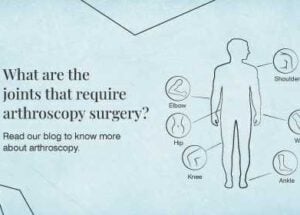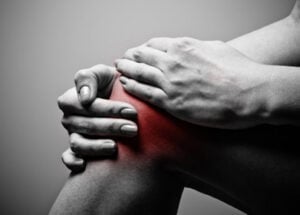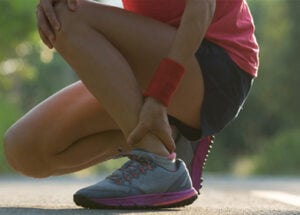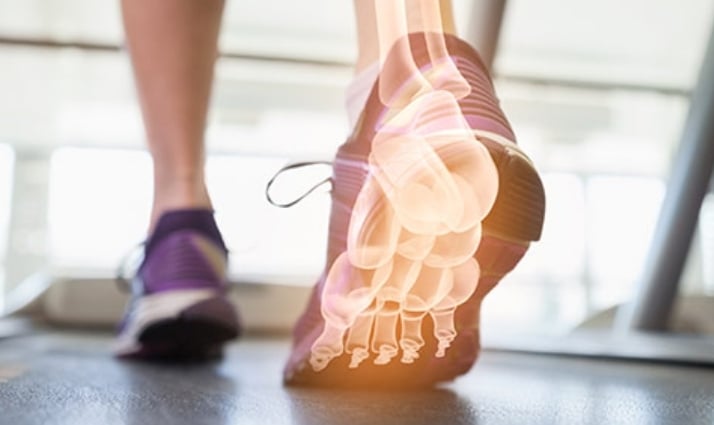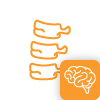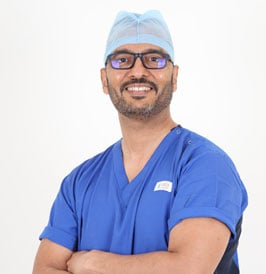Disk Prolapse (Herniated Disk) – Symptoms, Causes, and Treatment
April 10, 2025

A disk prolapse or herniated disk is a problem with one of the rubbery cushions (disks) that sit between the individual bones that make up your spine. A herniated disk, which can occur in any part of the spine, can irritate a nearby nerve. Depending on the location of the issue, it can result in pain, numbness, or weakness in an arm or leg.
When confronted with back pain and an MRI report that reads disk prolapse, every person feels a sinking feeling that he/she will never be quite normal again. Nothing can be further from the truth. Back pain is a fairly common complaint, and most cases are simple muscle strains or mechanical back pain resulting from poor posture and inadequate core strength.
These are self-limiting, but they have a propensity to recur due to the underlying cause, which is a lack of exercise and core strength.
The problem arises when these patients are subjected to an MRI scan and come back with a detailed report on the status of their disk, and poorly informed internet articles. To clarify, not all back pains are solely due to a disk prolapse. Most back pains are not caused by disk prolapse.
A simple examination, followed by medication and physiotherapy, will relieve the pain in more than 90% of cases. This, however, must be followed up by a good rehabilitation and strengthening protocol.
Causes of Disk Prolapse
- Jobs involving lots of lifting and sitting (especially driving)
- Weight-bearing sports (weightlifting)
- Smoking
- Being obese
- Age factors (a disk is more likely to develop a weakness as we become older)
Symptoms of Disk Prolapse
Prolapsed discs are most commonly found in the lower back, but they can also develop in the neck. The common symptoms include
- Arm and leg aches
If a person has a prolapsed disk in the lower back, they may also experience pain in the buttocks, thigh, calf, and foot. If the prolapsed disk is in the neck, a person will feel the most pain in the shoulder and arm.
- Numbness
- Weakness
Treatment for Disk Prolapse
Treatments for a prolapsed disk range from conservative to surgical. It depends on the level of discomfort that a person is experiencing and how far the disk has slipped out of place.
Rest can relieve swelling and give the back time to heal. If your back hurts, avoid exercises and other activities that require bending or lifting.
- Exercise
- Stretching exercises to keep your muscles flexible
- Aerobic exercises such as walking or riding a stationary bicycle
- Massage
- Heat and Ice therapy
General exercise is very important for everybody, and especially if a person has a prolapsed disc. It can help lessen the pain by strengthening the muscles that support the spine. Although it is not known if specific spinal exercises are better than generally keeping fit, a physiotherapist can advise you on what exercises you could do in this situation. Exercise not only reduces the pain of a prolapsed disc but may also reduce the chance of it happening again.
- Medications
- Anti-inflammatory painkillers
- Opioid medicines
- A medicine for Neuropathic Pain
- Microscopic Spine Surgery
Before you condemn yourself to a life of misery because of a diagnosis of disk prolapse, visit a spine surgeon. Get the right treatment and be back on your feet, doing the things you love, as soon as possible.
Dr. Rela Hospital is one of the multispecialty hospitals in Chennai, fully equipped with high-end technology to enhance safety and accuracy in complex spine surgeries. It is driven by expert spine surgeons and a fully trained team with more than 10 years of experience in dealing with complex spinal deformity correction, minimally invasive fusion and deformity surgeries for accelerated recovery, microscopic disk surgeries, motion-preserving disk replacement surgeries, and complex fracture reconstructions.
Injections for Herniated Disk
- Epidural Steroid Injection
- Nerve Root Injection
- Facet Joint Injection
- Medial Branch Block
- Sacroiliac (SI) Joint Injection
- Spinal Cord Stimulator Trial
- Surgical consultation, evaluation, and follow-up
Comprehensive Conditions We Treat at Dr. Rela Hospital
- Structural problems
- Scoliosis
- Spinal stenosis
- Degenerative disk disease
- Spondylolysis
- Spondylolisthesis
- Disk herniation
- Myelopathy
- Bone fractures
- Bone infection
- Rheumatoid arthritis
- Pinched nerves
- Bone spurs
- Radiculopathy
- Cysts and tumors, both cancerous and benign
- Conditions caused by traumatic injury
Don’t let a diagnosis of disk prolapse define your life. With the right treatment and care, recovery is not only possible but expected.


